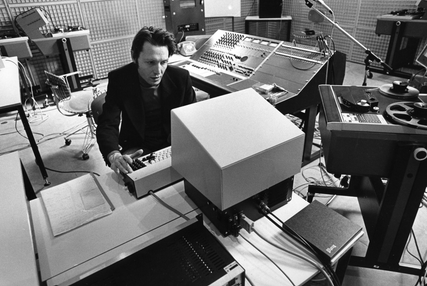Retour sur... les Rencontres internationales du Collegium Musicæ : Jean-Claude Risset
Le 2 et 3 mai dernier, se sont tenues les Rencontres internationales du Collegium Musicæ. Ces rencontres invitaient à la fois à saluer l’apport scientifique et artistique de Jean-Claude Risset, et à poursuivre la réflexion sur l’interdisciplinarité de la musique. Ces conférences ont débuté par une keynote du chercheur américain John Chowning.
« Jean-Claude Risset felt deeply committed to the culture of which he was a part, traveling widely and teaching with exceptional intellectual generosity. Over the years, Risset and I shared many lecture/concerts in many places, often with Max Mathews, Risset’s former mentor, the two of them having the highest mutual regard. Our own bond was rooted in the early years of discovery, the description and excitement of which was always an essential part of our lectures. He gave purpose and direction to the many students and colleagues who were attracted to him. His knowledge was encyclopedic, but what he revealed to us was always in context, illuminating and enriching our thoughts, our research, our music. He left us with his own music and writings, beautiful and profound—he is gone, but he did not disappear ». John Chowning , « Letters » [extrait], Computer Music Journal, 41(2), 2017
1'30 en Stravinsky avec John Chowning
Streaming des rencontres
Quelques textes...
« Jean-Claude liked to experiment and discover new possibilities of sound creation, but he also knew how to formulate his expectations and adapt his methods to reach his perceptual and aesthetic goals. He was the typical example of an art– science researcher or a science–art artist. He constantly juggled between the paradigm of scientific research and that of artistic research. Arts and science were intimately linked in his mind, and this was not always easy for his fellow researchers to accept, in particular at the Laboratory of Mechanics and Acoustics in Marseille, which is resolutely oriented towards formal sciences. It was un- doubtedly because of his kindness and his power to convince that our colleagues specializing in mechan- ics accepted that their ears were titillated by the “bizarre” sounds and even more “bizarre music” that emanated from our studios, at that time poorly soundproofed. » Richard Kronland-Martinet, Mitsuko Aramaki & Sølvi Ystad , « Letters » [extrait], Computer Music Journal, 41(2), 2017
« Jean-Claude Risset… Nous étions rue d’Ulm dans la même promotion de l’Ecole Normale Supérieure (ENS). Je l’admirais pour sa profonde culture littéraire et musicale, pour son talent de pianiste et aussi sa façon élégante de survoler le brouhaha des discussions entre maoïstes et trotskistes de cette époque à l’ENS. Il m’intimidait, mais nous nous sommes progressivement rapprochés pour parler de cinéma, musique et sport. Je me souviens bien d’une longue discussion, à la fois intense et calme, où je lui décrivais mon amour de la musique de jazz (Charlie Parker!) et où il m’a ensuite parlé, précisément et pédagogiquement, de musique de l’époque romantique. Il y avait entre nous, je pense, une amitié discrète mais réelle et ferme. Nous parlions peu de science mais j’étais impressionné par ce que je devinais de son ambition simple et forte de rapprocher physique et musique. J’ai suivi de loin le parcours de Jean-Claude, j’ai été heureux de ses succès scientifiques et de sa Médaille d’Or du CNRS. Une conférence à Marseille après mon Prix Nobel m’a permis de le revoir et de me retrouver proche de lui comme pendant nos années à l’ENS. » Albert Fert (médaille d’or du CNRS en 2003 et prix Nobel de physique en 2007). Lettre envoyée à l’Ircam en 2018
« A tutelary figure for IRCAM as well as for the whole world of new music and musical science, Jean- Claude Risset possessed an unlimited benevolence and open-mindedness, along with his farsightedness. He inscribed himself permanently in our imagination like those great figures who at times in history, from Pythagoras to Helmholtz and beyond, have advanced the quadrivium of the musical sciences, or who, like a Rameau, have achieved the rare alloy of a personal musical elegance and a systematic understanding destined to illuminate the path forward. » Gérard Assayag , « Letters » [extrait], Computer Music Journal, 41(2), 2017



